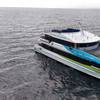The voting began on Sunday morning, where the enthusiasm and energy was apparent as each voter played their part in this historic event that determined the direction and future of the Canal and Panama.
By law, expansion, or the “third set of locks project,” must be put to a vote in a popular referendum. The Panama Canal Authority (ACP) presented its formal proposal to the Panamanian government in April. In the end, 78 percent voted for
expansion, as of 9:30 p.m. EDT.
“Today, Panamanians made history. We are honored by their trust and humbled by the responsibility in front of us,” said
Dr. Ricaurte Vásquez Morales, chairman of the ACP’s board of directors and concurrent minister for Canal affairs.
“We spent years studying, researching and preparing and we are ready. This project will be done efficiently and
transparently. With this vote, the Canal will be able to grow with demand, improve service, spur economic growth in Panama
and maintain the Canal’s competitive advantage,” Vásquez concluded.
After 92-years of serving world commerce, the Canal will have a major expansion. This expansion will accommodate surging
demand for the Canal’s routes and services, particularly the rapid growth in traffic from Asia, through the Canal, to the
United States and back -- known as the “All-Water Route.”
Expansion will build a new lane of traffic along the Panama Canal through the construction of a new set of locks, which will
double capacity and allow more traffic and wider ships. The Panama Canal is nearing maximum capacity and needs to grow
with demand. The result of comprehensive analyses and studies by the ACP, expansion is estimated to cost $5.25 billion
and will be paid by Canal customers through a system of graduated toll increases. An expanded Canal would benefit the
people of Panama and world trade, and would help maximize Panama's strategic location to become the great maritime
hub of the Americas.
Sponsored Content
Innovative Hull Maintenance: Profitable & Green

December 2024
 Read the Magazine
Read the Magazine

 Read the Magazine
Read the Magazine
This issue sponsored by:

Propulsion Choices begin with Fuel and End with Politics
Subscribe for
Maritime Reporter E-News
Maritime Reporter E-News is the maritime industry's largest circulation and most authoritative ENews Service, delivered to your Email five times per week










